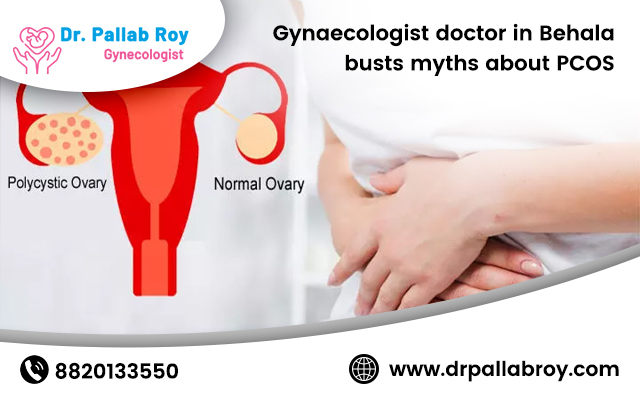PCOS (Polycystic Ovary Syndrome) is a prevalent hormonal disorder affecting millions of women worldwide. Unfortunately, there are numerous myths and misconceptions surrounding PCOS that often lead to confusion and unnecessary anxiety. A renowned gynaecologist doctor in Behala clears the misconceptions and common myths about PCOS.
1. PCOS is just about ovarian cysts: Contrary to popular belief, PCOS does not solely revolve around the presence of ovarian cysts. It is a complex hormonal disorder that affects the entire body. Several factors contribute to the syndrome, such as irregular menstrual cycles, insulin resistance, and an imbalance of hormones like oestrogen, progesterone, and testosterone.
2. PCOS only affects overweight women: While it is true that obesity and PCOS often go hand in hand, the syndrome can affect women of any weight. Women of all sizes can experience PCOS, making it essential to consult a gynaecologist for accurate diagnosis and customised treatment approaches. Identifying the symptoms and addressing them promptly will help manage the condition effectively.
3. Getting pregnant with PCOS is impossible: It is essential to understand that PCOS does not necessarily mean you cannot conceive. With proper diagnosis and treatment, many women with PCOS have successfully conceived and delivered healthy babies.
4. PCOS can be cured: Unfortunately, there is no permanent cure for PCOS but with the right intervention, women can effectively manage its symptoms and lead a healthy and fulfilling life. You can seek guidance from a gynaecologist for PCOS treatment in Behala for accurate diagnosis and effective management.
5. Birth control pills are the only treatment option: While birth control pills may be one of the commonly prescribed treatments for PCOS, it is not the only option. The right approach depends on individual symptoms, goals, and overall health. A renowned gynaecologist doctor in Behala recommends a variety of treatment options like anti-androgen medications, fertility medications for women trying to conceive.
6. You can detect the symptoms of PCOS yourself: While acne, mood swings, and cramps may be common during your menstrual cycle, it does not always mean you have PCOS. It is best to consult with a gynaecologist if you doubt your symptoms.
7. Ovarian cysts are present in all women suffering from PCOS: PCOS is sometimes linked to cysts because of its name, though this is not always the case. Many women have microscopic follicles in their ovaries that seem like cysts but are actually tiny follicles. They aren’t painful and are non-cancerous.
PCOS is a complex hormonal disorder that impacts the lives of many women. It is important to dispel the myths surrounding PCOS and understand the condition’s true nature. You can seek guidance from an experienced gynaecologist doctor in Behala for the right treatment approach and lifestyle modifications.

